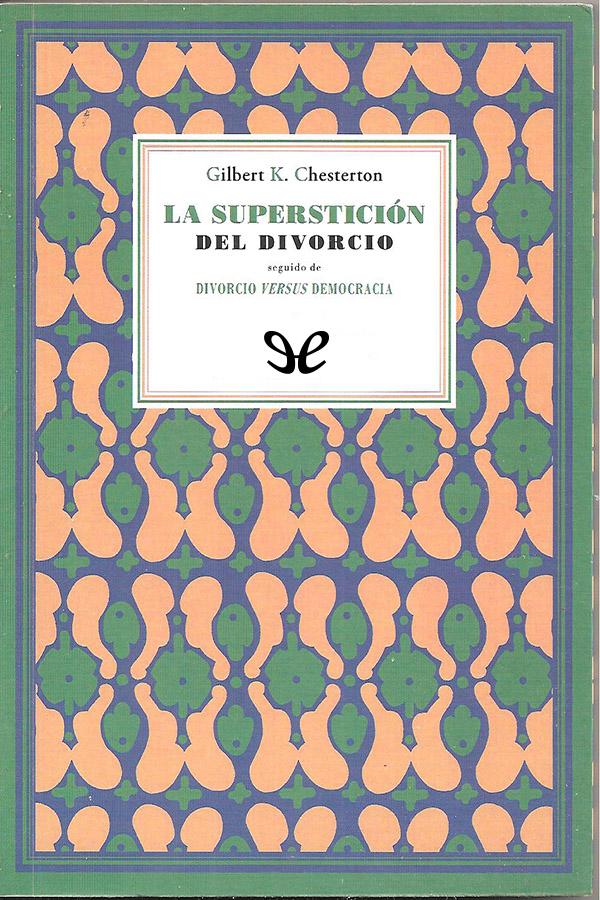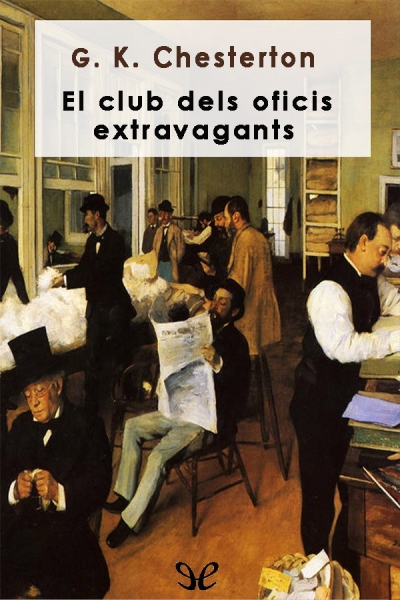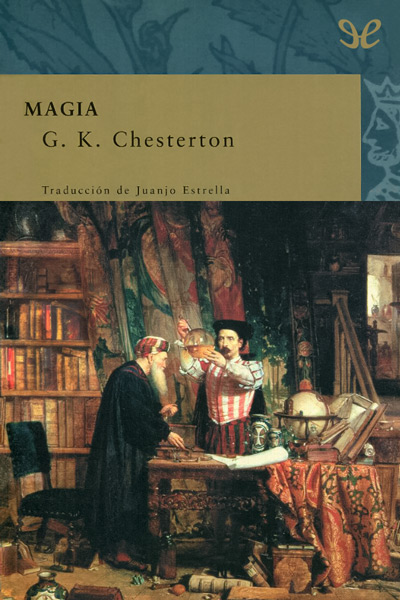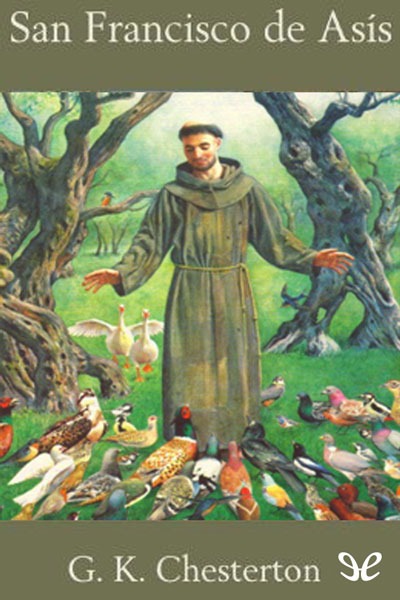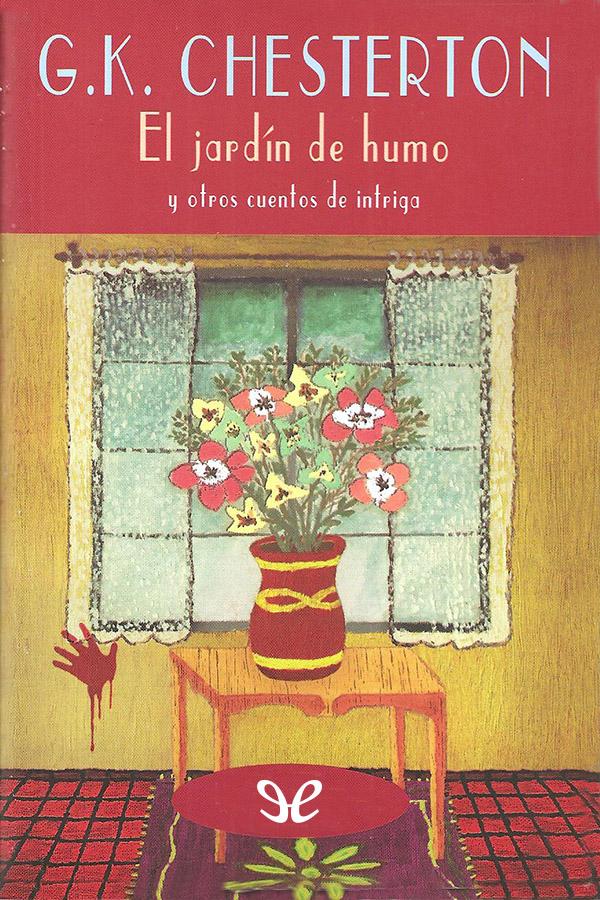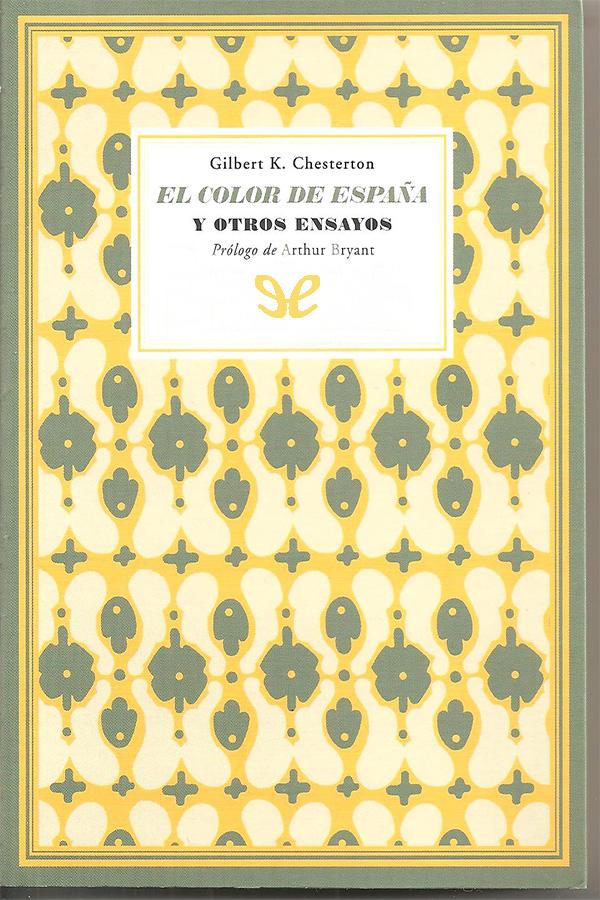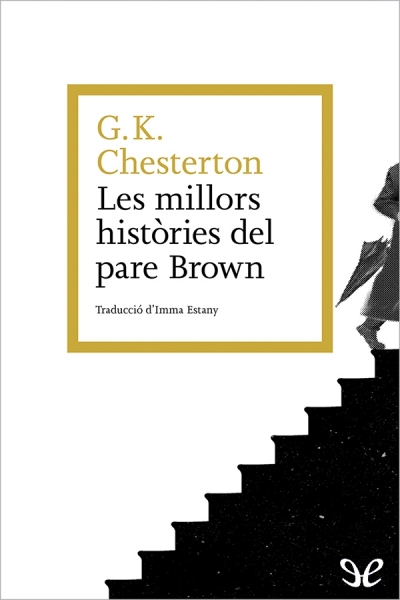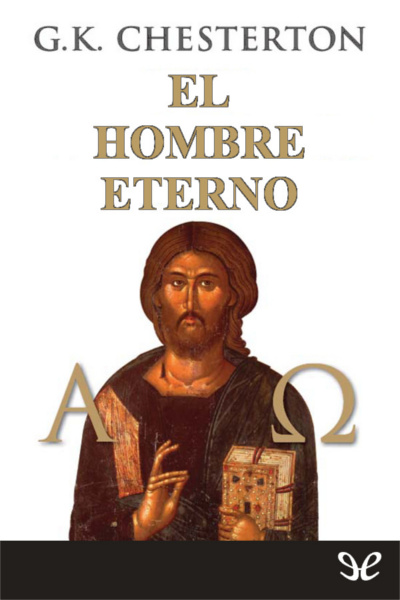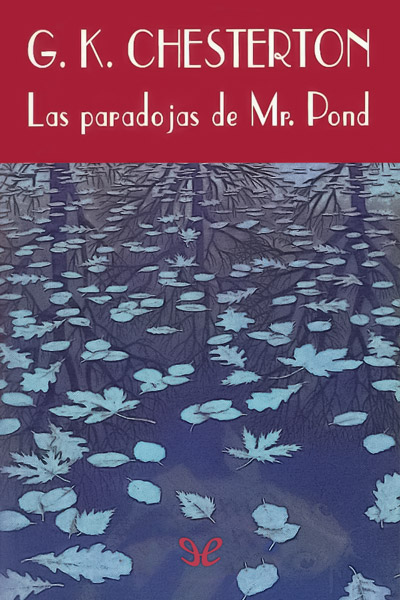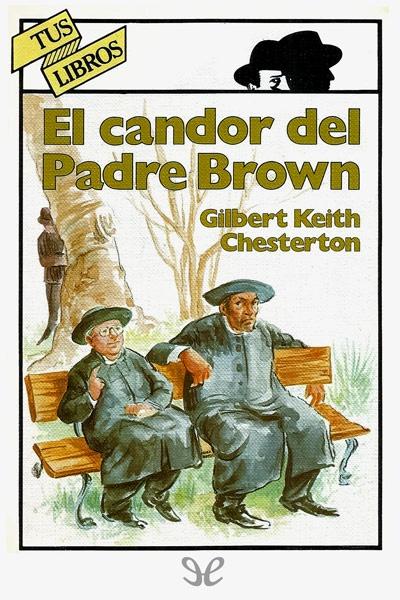oleebook.com
Els relats del Pare Brown de G. K. Chesterton
de G. K. Chesterton - Género: Intriga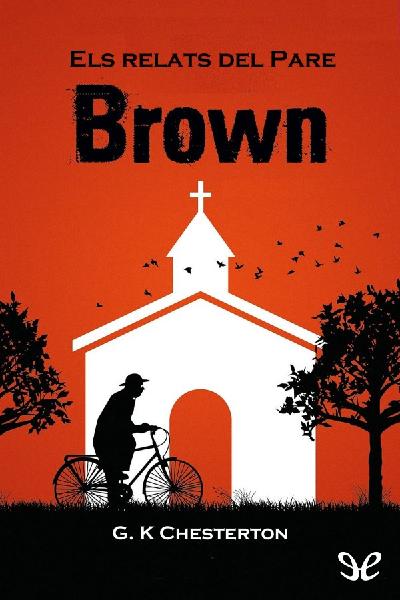
Sinopsis
El pare Brown, aquest capellà baixet i gras i daspecte ingenu, que es mou acompanyat pel seu paraigua, té una de les capacitats deductives més extraordinàries de tota la literatura dintriga. G. K. Chesterton va concebre el seu detectiu a lombra de Sherlock Holmes. El pare Brown posa en primer lloc la intuïció alhora que desplega el saber moral de qui ha passat moltes hores dins del confessionari.
El pare Brown ens convenç que totes les malifetes dels homes es deriven dhaver traït algunes òbvies i oblidades veritats elementals. Sense la sagacitat del moralista, la lògica i la deducció estan abocades al fracàs. Tanmateix, la tèrbola màgia dels misteris de Chesterton es resol sempre amb explicacions daquest món terrenal, i mai apel·lant als miracles o a la metafísica.
Libros Recomendados - Relacionados
Reseñas Varias sobre este libro
I'm pretty sure that this wasn't the edition of Father Brown stories that I read.
Anyhow I came to them after reading Sherlock Holmes. The Father Brown stories are rather similar in that the character of the detective is hugely important and each story is a free standing puzzle that the hero-detective resolves. The problem is that as far as I can remember the Sherlock Holmes puzzles are simply better thought through.
For example in one Father Brown story an Anglican priest murders the adulterous village blacksmith (or similar) by throwing a heavy object off the Church tower on to his head. Well, I suppose that would be fatal, provided that the victim was walking close enough to the tower and the Priest had plenty of time to practise and if he could lug said heavy object up the bell tower without being noticed. Perhaps he lay in wait for many a year with his trusty cannonball waiting for the blacksmith to one day ramble past within his shot put range. How unfortunate for the vengeful Vicar that the self same day Father Brown happened by to solve the crime with almost indecent haste.
In another story Father Brown foils a crime because he recognises a bunch of criminals at a pub that he stops at when his car breaks down - because naturally once a criminal always a criminal and a group of criminals in the same place must inevitably constitute a conspiracy apparently.
These are good stories if you the lead character to be a Catholic Priest who is able to hide his shrewdness and who has a thorough understanding of criminals gained through a lifetime of listening to confessions. To me they all came across as implausible, but with occasional interesting moments. Best appreciated on a rainy day, after the consumption of alcohol, or read aloud to the credulous using a variety of funny voices. 19th-century 20th-century british-and-irish-isles ...more32 s Zoeb184 47
Detectives have their distinctive methods. Hercule Poirot s to listen to his suspects and he listens so well that he could almost even read between the lines, discern what they were really trying to "say" in what they have already said. Sherlock Holmes, on the other hand, d to observe, to keep his eyes and other senses alert and register every single detail, even the most seemingly trivial ones, so that they all came together to form an incredible but all-too-logical deduction.
Now, Father Brown, a little, mild-mannered, congenial English priest from Essex, created, not by a writer of thrillers, un the above two sleuths, but by one of the greatest satirists of the Edwardian era, is a little different. To begin with, it is not really his occupation to snoop around or investigate murders in plush drawing rooms in equally plush locations or foil grand conspiracies and decipher even the smallest thefts and murders in the city and countryside. He is just a man of God, doing his job, in the strangest, quaintest way possible; he has learned his "method" by doing what he is supposed to do - listen, patiently, with infinite understanding, to what sins his fellow mortals have confessed to and thus also having understood, realised, a human capacity for not only irrational evil but also for an inherent error in committing the said error.
As Mr. Chesterton very succinctly explains it in the last, and one of the most memorable stories, in this reasonably slim little collection, "he differed from most detectives in fact and fiction in a small point - he never pretended not to understand when he understood perfectly well."
And so, this paradoxical little priest is the unly sleuth in these audaciously original, thrillingly ambitious and often equally satirical "detective" stories from Chesterton. True to what one expects from this writer, both lauded and controversial in equal measure, these are a brilliant subversion of the usual template - there are no formal meetings or conversations with Mr. Holmes in his study or none of Hercule Poirot's coincidental presence amidst the scene of crime. There are only a few that actually begin with the promise of a crime or see a detective, other than Father Brown, on the chase of a criminal; as for the rest, they begin as either modern stories of romance, treachery and intrigue or even as satirical parables about the English society of the era or even a comic jest at sensational American journalism.
And yet, as evidenced by Chesterton's brilliant, intuitive, lucid and always gripping prose and his excellent flair for both storytelling and humour, both drama and realism, these stories turn out to be exceptional, imaginative, prophetic and even emotionally resonant reading experiences and Father Brown, our little priest-cum-policeman of the soul's inner demons, turns in our eyes from an unly detective to one of the wisest and most astute characters in all fiction.
It is hard for me to pick favourites from this ensemble, really two small collections folded into one. The ones in the former are tighter, more focused towards the territory of crime and detection while the ones in the latter are more curiously experimental, even tugging Father Brown from England to Italy, America, the coast of Cornwall and into the realm of public scandals and medieval myths. Through it all, however, every story brings something new and intriguing for the reader, something incredible, sensational, shocking, mildly amusing and extraordinary in equal measure.
Hallelujah. 21 s Dhanaraj Rajan473 336
I was oscillating between 3 and 4 stars. I will settle for 3 and half stars. I think the last few stories tipped the scale. Or else would have ended up a four star book.
The book obviously has two collections of stories - THE INNOCENCE OF FATHER BROWN & WISDOM OF FATHER BROWN. For the first section I can give four stars. And the next section deserves three stars. But that is not to say that I did not enjoy reading the stories. I enjoyed reading these stories. They are absolutely lovely and Father Brown is a charming character. The mysteries (these are supposed to be detective stories) are not far too complex but still some of them are intriguing. The pleasure is in the language and the satirical remarks of G. K. Chesterton. If I were an English, I would appreciate all the more this work. For many references are related to England and its politics. There are plenty more for the non-English to enjoy as well. His witty takes on the modern society and its culture; the over dependence on science; (if Catholic) the witty critical remarks on Anglicanism, and Calvinism. You can read these witty remarks and I am sure you will not be able to control the chuckle or at times even the laughter.
Happy that I got introduced to Father Brown.literature literature-uk short-stories19 s Antonio Fanelli951 177
L'ho abbandonato.
Simpatico, ma nulla di che.
Erano molto meglio lo sceneggiato RAI con Renato Rascel e Arnoldo Foa e il film con Alec Guinnes.
narrativa poliziesco5 s Tom Brown17 2
Any book whose protagonist is described as having "a face as round and dull as a Norfolk dumpling" is bound to be a good read, and this collection certainly lives up to this idea. The mysteries are always intriguing and quite often I found myself being misled by the Prince of Paradox. The descriptions of Edwardian England are also quite illuminating and often give quite a good insight into the lives of certain sections of British society.
Having said all this, in a collection of short stories there are inevitably some which you enjoy reading more than others. My favourite mysteries from this book were: The Blue Cross, The Queer Feet, The Hammer of God and The Perishing of the Pendragons. All these stories excellently showcase Father Brown's particular gift for mystery solving; his unique insight into the human soul gained through hearing confessions and ministering to the faithful. I'd certainly recommend this book if you are looking for some relaxing detective fiction.4 s Suresh Ramaswamy111 4
The first question a spoiler would ask "5 Star " and that too for a poor detective story / book!!!!! Yes. While Father Brown does solve crimes, he is not a detective in the true genre of Conon Doyle or Ellery Queen. He is not even a detective of Erle Stanley genre. The crimes solved have hardly any gore, blood or multiple bodies in Agatha Christie genre - these are the detective stories that deserve 4, 5 and more stars. - Definitely not Father Brown.
Why I enjoyed Father Brown stories is the underlying analysis based purely on psychology maybe helped by some clues and incidents. I would just refer to the tale of "The Queer Feet" - why does the same person walk with a stately tread immediately after pattering lightly outside the room where Father Brown was seated? How is it possible for the same person to do so - he must be a great actor. Flambeau was not only a thief of greatest notoriety but also a master of disguise and acting.
Similar would be the case of the Invisible Man. Four respectable witnesses vouch that no one entered the building, but the man did it in full view, murdered his rival in live and walked out carrying the dead body - why - this again is in the realm of psychology, the way we think, etc.
If any other detectives come close to Father Brown, I would immediately cast my vote in favour of "The Black Widowers" created by Issac Asimov, who in their monthly meetings resolve many a unsolved mysteries.
It needs a different approach and taste to enjoy the tales of Father Brown or maybe tales of The Black Widowers and those who can will definitely appreciate and second my award of 5 Stars.
I enjoyed Father Brown immensely, the only regret being, I too felt bosh - what a funny tale - Detective Father Brown indeed - when my Dad introduced me to the character a few decades back. 3 s Lisa Findley833 17
My grandmother gave me this book after college, and seven years later, I finally gave it a try. The Father Brown stories are delightful! I even solved some of the mysteries before the other characters, which I am usually unable to do. I think this just means the mysteries aren't generally that complex, but I'll take it. Chesterton uses Brown not as a preaching mouthpiece, thank goodness, but as a sort of Catholic guide through the tales, should we choose to meditate on the spiritual aspects of the crimes and criminals. Should you choose not to, that's okay, the stories still stand up as fun little detective tales. Especially before Flambeau's taming.fiction short-stories-novellas3 s Eduardo Garcia-Gaspar294 11
Un detective aficionado, El Padre Brown, creado por Chesterton es distinto a lo ortodoxo que podrían ser Holmes o Poirot. Su apariencia es poco impresionante: bonachón, amable, simpático, inocente... pero poseedor de una perspicacia única en eso de conocer a la naturaleza humana y esa es su arma investigadora. Muy recomendable para quienes aún tienen la mente por encima de escenas sangrientas, crímenes con lujo de violencia y emociones rápidas.ficcion3 s Mariano Hortal841 186
Deliciosa la lectura de "Los relatos del padre Brown" , Chesterton y su sentido común nos brindó una obra imperecedera, maravillosa y literaria y con un personaje genial. El rey de la paradoja es necesario e imprescindible. british-literature genre-noir-hardboiled-detective3 s Sara Echeverri Rodriguez9 1 follower
Las historias del padre Brown y su forma de resolver crímenes al estilo Sherlock Holmes son muy divertidas para leer algo diferente.3 s Catherine485 1 follower
When I scanned the barcode from the copy I read I was directed to a complete collection, whereas the Wordsworth classics paperback, the Penguin, has a selection ... and a rather similar cover, so I've picked this as best match.
Anyway. I'm fairly certain I read some of these via Mum, a great Chesterton fan, when I was much younger but I have no recollection of the eponymous detective or any of the plots. Father Brown seems to have two uncanny abilities: to be in the right place at the right time (he is specifically engaged for very few of the cases in this collection) and to make clever leaps that help him solve mysteries from very few clues. Holmes, of course, does much the same, but with more obvious logic and less intuition which makes him a far more satisfying person to read about, in my opinion. I also think these stories have dated far more than Conan Doyle's. There is a lot of not always incidental stereotyping and prejudice towards people of particular nationalities or religions and I switched off during some descriptions and musings. Some of the tales were interesting enough, and I may read the rest one day if only to find out the circumstances of Flambeau going straight. bookcrossing2 s Faith B899 16
I wish that goodreads let you do 1/2 stars, b/c I feel book should get 3 1/2...so I rounded up.
Anyways, I d the stories a lot, quite entertaining, and not a hard read at all. G.K. Chesterton made Father Brown so incongruous(sp?) that I would read his name and then forget the stories were about him...very cool.british-literature mysteries2 s Marc3,201 1,524
Detective stories with a deeper layer. Normally, detectives are not my thing, but in this case Chesterton offers striking psychological drawing and a light spiritual touch, that often surprises. I think I'm going to read more of this author.english-literature2 s Leandro DutraAuthor 4 books46
Minus one star for the standard Romanist (and Arminian, & Lutheran, & Mormon ) anti-Calvinistic hate. But remarkable story telling, and even hating the Reformed faith still manages to capture some of the Christian faith.davi-pinto2 s Samuel 228 24
Otec Brown je jednou z prvých detektívnych kníh, ktorú som pre?ítal a aj ke? som bol vo?i detektívnemu anru skeptický, vetok skepticizmus je pre?. Smieny pajko, ?o vyriei vetky zahady a robí si srandu z ateistov a materialistov, to je Otec Brown akého mohol vymyslie? len Chesterton. koda, e v slovenskom preklade a vydaní je viacej chýb, nezrovnalostí, ale to je len taký detail, ktorý v kone?nom dôsledku neuberá na kvalite. Mono ?o môe by? trochu otravné je skôr opakujúce sa rozuzlenie príbadov, ktore nechcem vyzrádza?, ale dáva detektívkam nový rozmer. Odporú?am :)klasika2 s AndreaAuthor 8 books195
These are truly delightful stories, particularly the ones from Chesterton's first collection -- no accident then that they form the bulk of this collection. There is something I just absolutely love about Chesterton's prose, his lurid descriptions of landscapes that set the scene with mountains f glorious adjectives. His sense of humour too, I remember while reading it I kept jogging my partner's elbow and showing him phrases I particularly enjoyed or that made me laugh -- not something I am usually inspired to do! I didn't mark them however, too much marking and working through books for the dissertation I think! But this was the perfect counterpoint. mystery-noir1 Lauri864
Päris kobe vana hea inglise kriminaaljuttude kogumik, ajastule vastavalt paljusõnaliselt ja ohtra moraalilugemise saatel kirja pandud, kuid olemuselt siiski mõnus ja turvaline lugeda.
Tegelikult võiks seda isa Browni eesti keeles rohkemgi olla, Chestertonil on teda tervelt 55 jutu ja 5 kogumiku jagu, eesti keeles (selle kogumiku ja igivana Loomingu Raamatukogu peale kokku) hädised 15, ehks siis ainult veidike rohkem kui veerand...1 Amanda mcguire1,270 6
The Innocence of father Brown
The blue cross - 3 stars
The Secret garden - 3 stars
The queer Feet - 3 stars
The invisible man - 3 stars
The honour of Israel Gow - 3 stars
The Hammer of God - 3 stars
The sign of the broken sword - 3 stars
The Wisdom of father Brown
The paradise of thieves - 3 stars
The mistake of the machine - 3 stars
The perishing of the pendragons - 3 stars
The strange case of john boulnois - 3 starsclassicsread readin20211 Leonardo Ricci26
Although they were written in the 1910s, these detective stories are still highly enjoyable in 2021, and make for a relatively easy read. G.K. Chesterton may occasionally come across as a bit preachy or biased against atheism, in some of the storieshe was a fervent Catholicbut that did not detract too much from my enjoyment of what remains an entertaining collection of short stories.classics crime-novel detective-stories ...more1 Marie D.7
Some stories are definitely better than others, but I greatly enjoyed them overall. This is a nice compilation to pick up, read a short story, and move onto something else, and be able to pick up again with the next story. 1 Andreas_P26
"The little priest was so much the essence of those Eastern flats; he had a face as round and dull as a Norfolk dumpling; he had eyes as empty as the North Sea; he had several brown-paper parcels, which he was quite incapable of collecting. The Eucharistic Congress had doubtless sucked out of their local stagnation many such creatures, blind and helpless, moles disinterred."
An evocative introduction to a character, if there ever was one. The Penguin Popular Classics "Father Brown Stories" chronologically traces the career of Chesterton's deceptively naïve sleuth, the Roman Catholic clergyman Father Brown, and his equally unly friendship with the master-criminal Flambeau. The "Father Brown Stories" contains seven short stories originally published in "The Innocence of Father Brown" (1911), and four short stories from "The Wisdom of Father Brown" (1914).
This was my first encounter with G.K. Chesterton's Father Brown stories, and my general impression was that the majority of the stories had a fanciful air to them that was too overdone for my liking. Constant mentions of the 'fiery Presbyterian temperament', 'swarthy complexions', and tortured military colonels living in dark, remote hovels can become tedious. I also had an issue with the 'storytelling' style of prose that cropped up in a handful of the stories, which take the form of Father Brown's impossibly detailed recollections of events thirty years prior. These had all the thrill and excitement of a 'Who's Who' entry.
Yet, even in these weaker stories, Chesterton shows himself as perhaps the most sublime, in terms of sheer writing ability, of all the Golden Age detective authors. Chesterton has a skill for transporting you to a place, often an East Anglian village that time has forgotten and where old rivalries live on, that is particularly rare. The stronger stories, though regrettably few and far between in this collection, are excellent, and are to be enjoyed and cherished. "The Honour of Israel Gow", and "The Hammer of God" are two superb countryside mysteries. These are chock-full of dread and superstition for the lovers of the supernatural myself, though mercifully lacking the aforementioned excesses found in many of the stories. Father Brown's quiet logic wins the day in these two stories, and I would go as far as to recommend them to complete beginners to detective fiction, as some of the best examples of what the genre has to offer.1 Tex-49655 48
Questo volume racchiude tutte e 5 le antologie di racconti su padre Brown, pubblicate separatamente in anni diversi; ho letto le prime due con interesse decrescente, poi ho desistito.
Ogni racconto tratta un caso, che sia un delitto, un intrigo o un semplice mistero, sono gialli, ma privi di investigazioni; il lettore non ha nessun modo di intravedere la soluzione che giunge all'improvviso,
grazie all'intuizione, psicologica o spirituale, di padre Brown, che risolve il caso e svela il mistero.1-narrativa gialli Yannis92
Got it as a cheap collection of crime stories. It was worth it although they became kinda repetitive in their form and Brown's explanations came almost out of nowhere. Sure, he is clever and has some great intellect but is he *that* kind of genius? He isn't described as one in the beginning. I mostly d how the 2 characters that seem to be the main characters in the first story end up later on but the rest of the stories were kinda forgetable though enjoyable.classic crime Jon351
I will concede that I read the Dover Thrift edition, which is not a well put together collection and at some point will need to read the whole anthology. Chesterton has created an affable and entertaining character in Father Brown. However, as a detective and as mystery stories I found most of them to be extremely lacking. In all of these stories, Chesterton just lets Father Brown pull the solution out of thin air at the end. Thats not how mysteries work and these suffer because of it. BrianAuthor 3 books35
The stories are enjoyable enough, but theres something about them that I dont love. I feel the reader isnt given enough to really play along at home. Some of the stories build up a series of clues that lead to a satisfying revelation, but others are considerably more fantastical in their explanations. I also feel Father Brown is kinda shoehorned into a few of them. Still, Id probably read more of these if I came across them.fiction m short-stories-n-essays Jan Komrska127 14
The crime and the mystery stories resolved by a small, disorganized, ordinary priest - father Brown. Besides some derogatory comments about Scottish people (in prehistoric times they worshiped devils or his scotch religion was made up by men who prayed oh hills and high crags, and learner to look down on the world more than to look up at heaven) the stories tend to start slowly and they become interesting only towards the end Too many words :-)classics Richard PierceAuthor 5 books39
Quite amusing, but obviously dated. The conundrums are very interesting, and the devil-may-care Flambeau is quite the anti-hero/hero. I'm sure I remember these being made into 90-minute dramas on German telly in the early 70s. Paul Eichwald Rojas54 1 follower
Me pasa mucho con Chesterton que no sé si las traducciones son malas o él escribe muy extraño. Tiene frases muy buenas, pero el contexto general es aburrido lleno de interminables razonamientos que muy pocas veces tienen una clara lógica. Henry Martínez28
No conozco a nadie que haya encontrado una página de los cuentos del padre Brown como aburrida. La acción no sólo física sino metafísica de sus relatos hace trabajar nuestra imaginación con insospechado frenesí. Verdaderas horas de alegría y felicidad encierran sus páginas. Subhojit Bera83 15
Autor del comentario:
=================================
